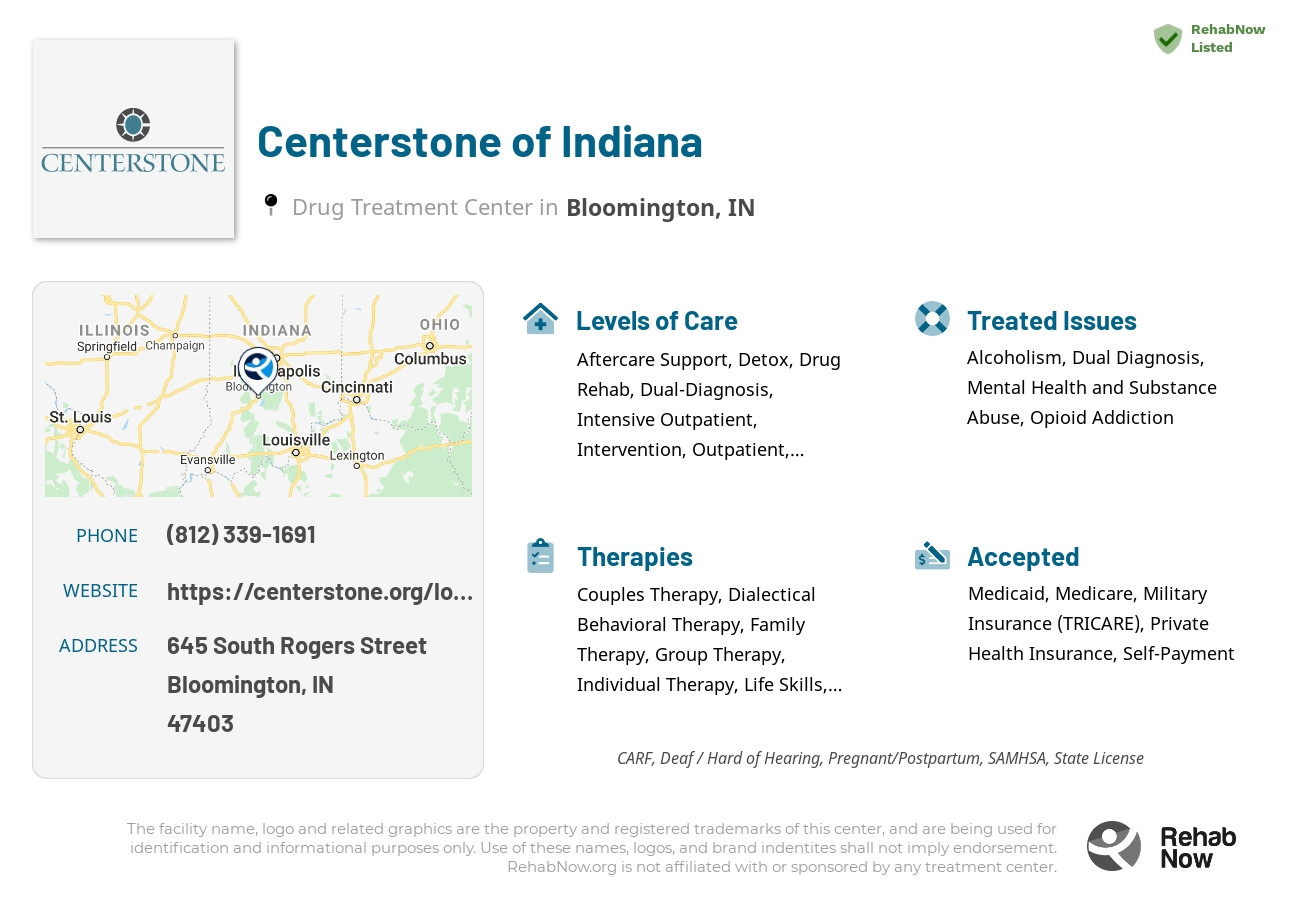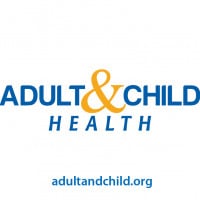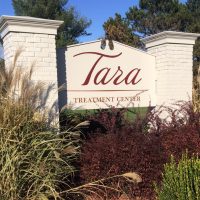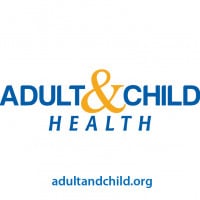Centerstone of Indiana
Drug Rehab Center in Bloomington, Indiana
Centerstone of Indiana is a comprehensive addiction and substance abuse treatment center with a holistic approach, offering a variety of services and therapies, including virtual counseling sessions, medication-assisted treatment, and support for long-term recovery.
About Centerstone of Indiana in Indiana
Located in Bloomington, IN, Centerstone - South Rogers Street is a private rehabilitation facility that stands out for its comprehensive treatment of substance abuse and mental health. This not-for-profit health system is committed to changing lives by offering a wide variety of services and programs, uniquely tailored to meet the needs of individuals suffering from addiction.
Centerstone of Indiana in Bloomington is distinguished by its accreditations from the Joint Commission, Commission on Accreditation of Rehabilitation Facilities (CARF), SAMHSA, and the state of Indiana. These certifications underscore the facility's dedication to providing evidence-based care. Moreover, the center's approach includes aftercare, support, and medication-assisted treatment, focusing on both addiction and underlying mental health issues.
- Accredited Care: Centerstone boasts prestigious accreditations, ensuring high-quality and evidence-based treatment approaches.
- Comprehensive Treatment Options: Offers a range of care levels including Detoxification, Residential, and Outpatient services, catering to individual needs.
- Integrated Mental Health Support: Unique in providing medication-assisted treatment alongside mental health services, addressing co-occurring disorders effectively.
Centerstone - South Rogers Street specializes in addressing a plethora of addictions and related issues, employing a variety of treatment methods such as Detoxification, Drug Rehabilitation, and Dual-Diagnosis support. They offer various levels of care including Intensive Outpatient, Partial Hospitalization, and Residential services, ensuring tailored support for every individual's journey to recovery.
Genders
Ages
Modality
Additional
Accreditations
State License
SAMHSA

JCAHO

CARF
The Commission on Accreditation of Rehabilitation Facilities (CARF) is a non-profit organization that specifically accredits rehab organizations. Founded in 1966, CARF's, mission is to help service providers like rehab facilities maintain high standards of care.
Conditions and Issues Treated
Opioid addiction starts when a person becomes addicted to legal or illegal opioids. The addiction can happen quickly, in just a matter of days. Opioid withdrawal can be extremely uncomfortable and lead the user to continue to use even if they want to quit. Stopping using an opioid requires medical observation. Sometimes inpatient treatment with a medically supervised detox is necessary for managing the withdrawal process while learning lasting tools for maintaining recovery. Medications may be used in some cases of opioid addiction.
Opioid addiction is one of Indiana‘s most prominent forms of addiction. It’s treated by detoxifying the body so that the chemicals from the medications no longer impact them and by therapies to correct behavior and target the root of the problem.
Recovery is not simply about stopping drug use. Recovery is working with addiction while recovering mental health issues that are fueling the addiction in the first place.
Levels of Care Offered
This center offers a variety of custom treatment tailored to individual recovery. Currently available are Aftercare Support, Detox, Drug Rehab, Dual-Diagnosis, Intensive Outpatient, Intervention, Outpatient, Residential, Sober-Living / Half-Way, with additional therapies available as listed below.
Detox is the first step of rehab. It involves giving a person time to get the toxins out of their body. During detox, the patient gets ill and they will often start using again to get rid of these unpleasant feelings. That’s why it’s so important to have a Bloomington medical professional at Centerstone of Indiana present. A Indiana medical professional will make sure patients don’t start using during detox. They will also provide medication to ease their symptoms and coach them through on a mental level.
Addicts who need help with their addiction can enroll in an intensive outpatient program (IOP). But the patient won’t live there during treatment.
IOP involves patients visiting a medical office building regularly for therapy and other services while continuing to live their lives.
IOP is a step up from drug or alcohol detox, but it’s still a phase of recovery, not the end goal. Patients in need of IOP have many options for rehab and treatment.
Outpatient treatment is considered the lower intensity level of addiction treatment. It’s ideal for early phase addiction or lower intensity addictions. It may include weekly sessions instead of daily. It may include weekly sessions instead of daily. Peer group support, 12-step programs, and individual counseling may still be involved but at a lesser frequency than an intensive outpatient program. It is a good choice for someone who doesn’t need to go through a medically supervised detox and who has a supportive home environment. It requires motivation and dedication to commit to the program without constant monitoring.
Sober living homes (abbreviated SLHs or sometimes sober houses) are temporary housing for recovering addicts. The typical SLH functions as a halfway house, providing a stable living environment for addicts in recovery. While at an SLH, residents typically meet with various therapists on site and attend regular 12-step meetings as well as other recovery group meetings.
Residential treatment programs are those that offer housing and meals in addition to substance abuse treatment. Rehab facilities that offer residential treatment allow patients to focus solely on recovery, in an environment totally separate from their lives. Some rehab centers specialize in short-term residential treatment (a few days to a week or two), while others solely provide treatment on a long-term basis (several weeks to months). Some offer both, and tailor treatment to the patient’s individual requirements.
Not everyone dealing with addiction is prepared to engage in a recovery program. Centerstone of Indiana‘s Intervention Programs can be beneficial for these individuals. The individual’s friends and family will call and set up an intervention in or near Bloomington, IN, and at which a specialist will come and lead the discussion.
Aftercare support should take place after outpatient treatment has ended. There are a few different types of aftercare support that patients can seek. These include 12 Step, Self-help groups (AA, NA), Therapeutic communities, Long-term, structured sober living arrangements, and Halfway houses (residential treatment centers).
Therapies & Programs
Individual therapy involves one-on-one sessions between the patient and therapist. It provides patients with a safe environment to openly discuss personal and sensitive issues with the therapist. They find the therapist as someone they can trust. Individual therapy aims to identify the core issues that would have led the patient to substance abuse and address them effectively. The therapist can develop patient-specific customized solutions through individual therapy, which aids speedier recovery.
Couples therapy works with clients and significant others in a professional capacity to improve relationship dynamics. This can be helpful for addicts who are trying to marry the idea of recovery into their work, family, social lives – any aspect that has to do with relationships.
Through counseling sessions, addicts will have an opportunity to talk about their addiction with professional partners. These partners can offer feedback and advice on how to get sober while keeping healthy relationships intact. A good couples therapist will help addicts understand their part in an unhealthy relationship dynamic or find ways to deal with anger or resentment from significant others outside of the home.
Family therapy is a group problem-solving that aims to improve communication and relationships between the addict, their family, and sometimes friends. The main goal of family therapy for drug addiction is to create an environment where communication can occur without judgment, hostility, or blame. The therapist is with the family as they learn to communicate differently, especially with the addict when s/he is using. The family can learn to reduce their enabling behavior or rally together and support each other during tough times.
An addict’s family can play a vital part in helping them to avoid relapse because they can spot the warning signs and help them get back on track before it becomes too much of a problem. Family therapy is one of the most effective ways to help addicts stay on the path to long-term sobriety. When a drug addict decides that they want to try and get sober, it takes the support of every person they love to succeed. It can be incredibly difficult for loved ones to watch an addict go through the pain and suffering of withdrawal, but by being there with them and supporting them, they can help to make sure that the addiction never returns.
Groups typically involve meetings with other recovering addicts who can relate to one another’s experiences. They might meet in person or online and typically focus on the process of staying sober rather than overcoming a specific addiction.
In these groups managed by Centerstone of Indiana, addicts can build a sense of community and develop strong emotional connections with others who understand what they are going through. These beneficial relationships can help addicts overcome their cravings and prevent relapse at any point during the recovery process.
In general, trauma therapy is a clinical process that helps individuals deal with mental stress often caused by traumatic events. The therapist helps the person identify, understand, and work through the problem. This is done with the help of talking about it in group or one-on-one counseling sessions. Therapists use relaxation, role-playing, art, and music to help the person open up about what is bothering them.
There are many different types of trauma therapists, such as psychiatric nurses and counselors. Not everyone is a good candidate for this type of therapy; it is generally reserved for people who have recently experienced a traumatic event and struggle to get over it. It is often done for children, teenage victims of sexual assault, and war veterans.
Dialectical Behavior Therapy (DBT) is a type of therapy created in the late 1980s and early 1990s to help people with high rates of suicidal behavior. DBT helps people learn how to live a life that is no longer controlled by overwhelming emotions and urges. It is beneficial in treating drug addiction because it helps patients understand and cope with their cravings for drugs or alcohol rather than turning to those substances as a way of coping.
Since addiction is a chronic physical and mental illness, addicts need to learn as many life skills as possible. Many drug treatment centers offer life skills activities as part of their addiction recovery programs. Examples include cooking classes, employment training, resume writing seminars, parenting classes, and computer training. Life skills activities help addicts find employment, take care of their families, and give back to the community.
Payment Options Accepted
For specific insurance or payment methods please contact us.
Is your insurance accepted?
Ask an expert, call (888) 674-0062
Centerstone – Indiana Associated Centers
Discover treatment facilities under the same provider.
- Centerstone - Richmond in Richmond, IN
- Centerstone - Bloomington in Bloomington, IN
- Centerstone - Connersville in Connersville, IN
- Centerstone - Hillcrest Road in Bedford, IN
- Centerstone of Indiana Inc Recovery Engagement Center in Bloomington, IN
Learn More About Centerstone – Indiana Centers
Additional Details
Specifics, location, and helpful extra information.
Bloomington, Indiana 47403 Phone Number(812) 339-1691 Meta DetailsUpdated April 15, 2024
Staff Verified
Centerstone of Indiana Patient Reviews
There are no reviews yet. Be the first one to write one.
Bloomington, Indiana Addiction Information
The state of Indiana ranks 14th in the nation for drug abuse, but 17th for drug overdoses. The state has many high-quality rehabilitation centers, but reports show that there are about 20 deaths per 100,000 people. This is due to its location making it a drug trafficking haven, where many drugs are further distributed into the country.
Bloomington, IN has seen an increased number of drug-related crimes, overdoses, and deaths. In 2013, 39% of all overdose cases were related to prescription drugs. The majority of these incidents involved opioids such as Oxycontin or Fentanyl. Drug treatment in Bloomington, Indiana, can vary depending on the facility, but most programs will offer various services such as individual and group therapy, medication management, and aftercare planning.
Treatment in Nearby Cities
- Rockport, IN (92.5 mi.)
- Kendallville, IN (171.5 mi.)
- Evansville, IN (99.4 mi.)
- Decatur, IN (143.6 mi.)
- Logansport, IN (110.7 mi.)
Centers near Centerstone of Indiana
The facility name, logo and brand are the property and registered trademarks of Centerstone of Indiana, and are being used for identification and informational purposes only. Use of these names, logos and brands shall not imply endorsement. RehabNow.org is not affiliated with or sponsored by Centerstone of Indiana.











